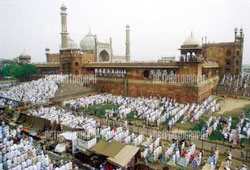|

Id Ul Fitr is a festival that marks the end of the Ramzan
period, and usually falls on a new moon night, in the month
of April or May. Ramzan is the ninth month in the Muslim
calendar. According to legend, the Holy Koran was revealed
in this month. Ramzan is thus regarded as highly auspicious
month and fasting and prayers mark it. Muslims keep a fast
every day during Ramzan. The rituals associated with Id and
Ramzan have remained unchanged for centuries. Muslims
through out the world and in India observe fast throughout
this month and eat and drink only in the night. All types of
entertainments and ceremonies are shunned during this period
as it is exclusively meant to dedicate oneself to Allah and
show devotion by prayers at all the prescribed times,
reciting Quran and celebrating nights with feasts and family
get- together. Eid is the time for celebration and marks the
happiness or festivity for the men and women who follow the
doctrines of Islam. On the day of the festival Muslims
gather in large groups at mosques, and offer their prayers
or namaz. Id is one of the most important sacred festivals
in the Muslim religion. Muslim people from all strata of the
society dress up in new clothes to celebrate Id with great
enthusiasm. Everybody greet each other on this day. Special
dishes are prepared on this day to mark the festive
occasion. Women prepare delicious sweetmeats at home, and
vermicelli kheer (sweetened milk) is a popular dish
People also do a lot of charity on this auspicious day as a
part of the festive rituals. Muslims in India give gifts in
kind or cash to the needy and poor. The first Eid of the
year is known as 'Eid-al-fitr' meaning 'breaking the fast'.
The reason behind keeping fast during Ramadan refers to the
legend of the Prophet Mohammed who left Mecca and undertook
the journey to Medina in 622 AD, to join the other Muslims
who had migrated to Medina to escape persecution in Mecca.
During this period, he fasted for three days. Many years
later, He was to receive a revelation from God, which stated
that all followers of the Islam faith fasted for a certain
number of days. According to Islamic belief fasting helps to
develop self-control and a means of coming closer to Allah.
It purifies one's soul. The festival is a day of joy and
thanksgiving. The Muslims with great fanfare celebrate it.
In India even Hindus also participate in the celebration.
Do Rakat Namaz, the Id-special prayer is performed in the
morning in the mosque. Charitable gift, called Sadaqah Fitr,
is a dole to break the fast. It is to be given to a needy
person as thanksgiving. Even one who has not kept the rojas
is expected to give alms. The amount to be gifted depends on
one's essential needs and free from all encumbrances of
debt. Even women in veil attend the prayers in special
chambers. The 30-day fast is broken on Id-ul-Fitr with
sumptuous feasts which people embrace each other three
times, as is laid down in the Quran. The festival originated
when after proclaiming Ramadan as the period of fasting and
austerity, Prophet Muhammad announced a day for celebrations
to reaffirm the feeling of Id-ul-Fitr brotherhood.
|